Australian Consumer Law Assignment: Analyzing Contracts and Breaches
VerifiedAdded on 2021/05/30
|8
|1791
|51
Homework Assignment
AI Summary
This assignment delves into the intricacies of Australian Consumer Law, specifically addressing issues of misrepresentation and breach of contract within the context of a business transaction. The assignment analyzes a scenario where a vegetable shop is sold based on misrepresented facts, examining the legal implications of fraudulent misrepresentation as defined in cases like Derry v Peek and Smith v Land & House Property Corp. It explores the remedies available to the buyer, including rescission and damages, referencing the Competition and Consumer Act 2010 and the Sale of Goods Act 1954. Furthermore, the assignment examines a breach of contract scenario, focusing on implied terms and the seller's obligations under the Sale of Goods Act, as supported by cases like Doyle v Olby (Ironmongers) Ltd and Commonwealth Bank of Australia v Barker. The analysis considers the buyer's rights to claim damages for both misrepresentation and breach of contract, providing a comprehensive overview of the legal principles and their practical application.
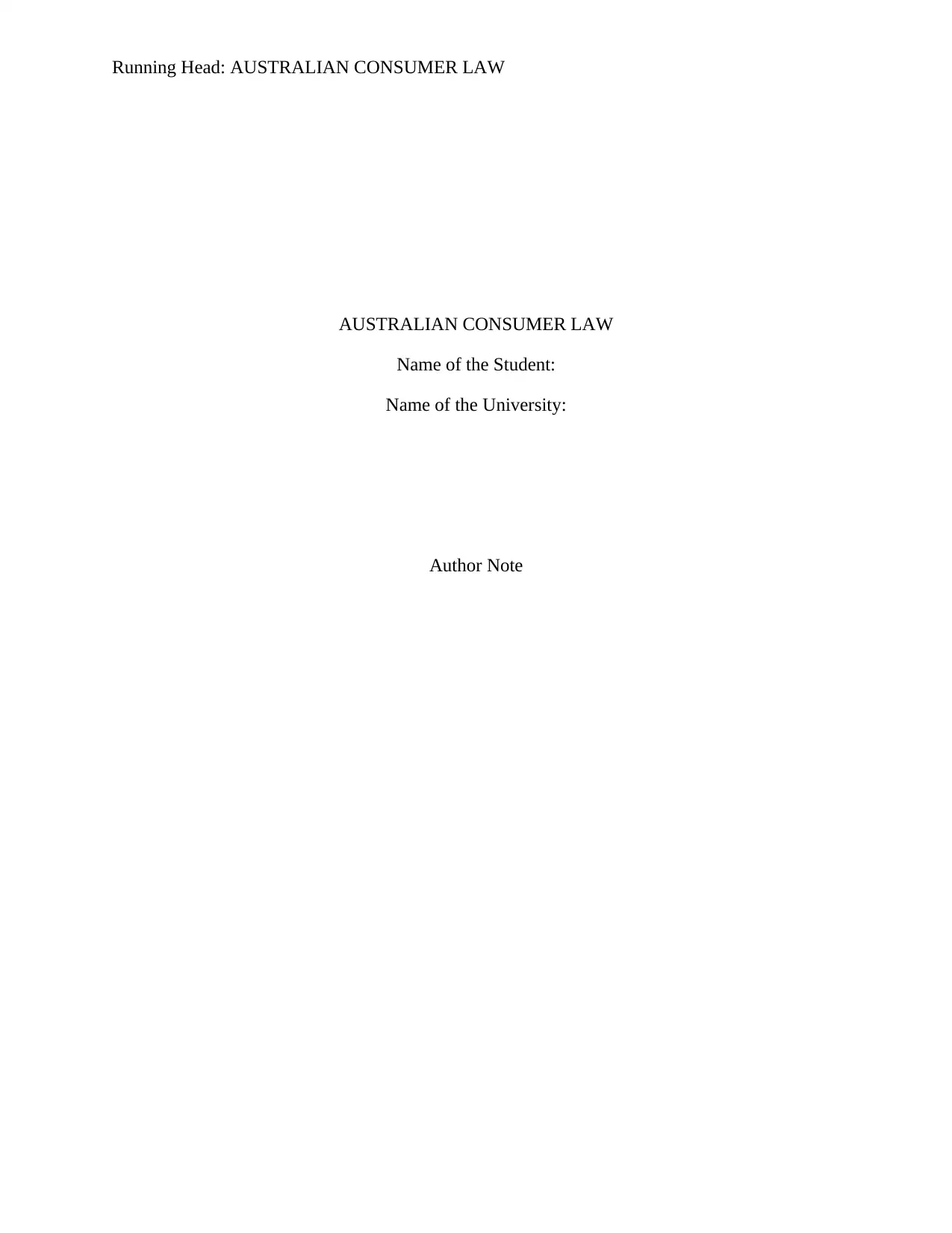
Running Head: AUSTRALIAN CONSUMER LAW
AUSTRALIAN CONSUMER LAW
Name of the Student:
Name of the University:
Author Note
AUSTRALIAN CONSUMER LAW
Name of the Student:
Name of the University:
Author Note
Paraphrase This Document
Need a fresh take? Get an instant paraphrase of this document with our AI Paraphraser
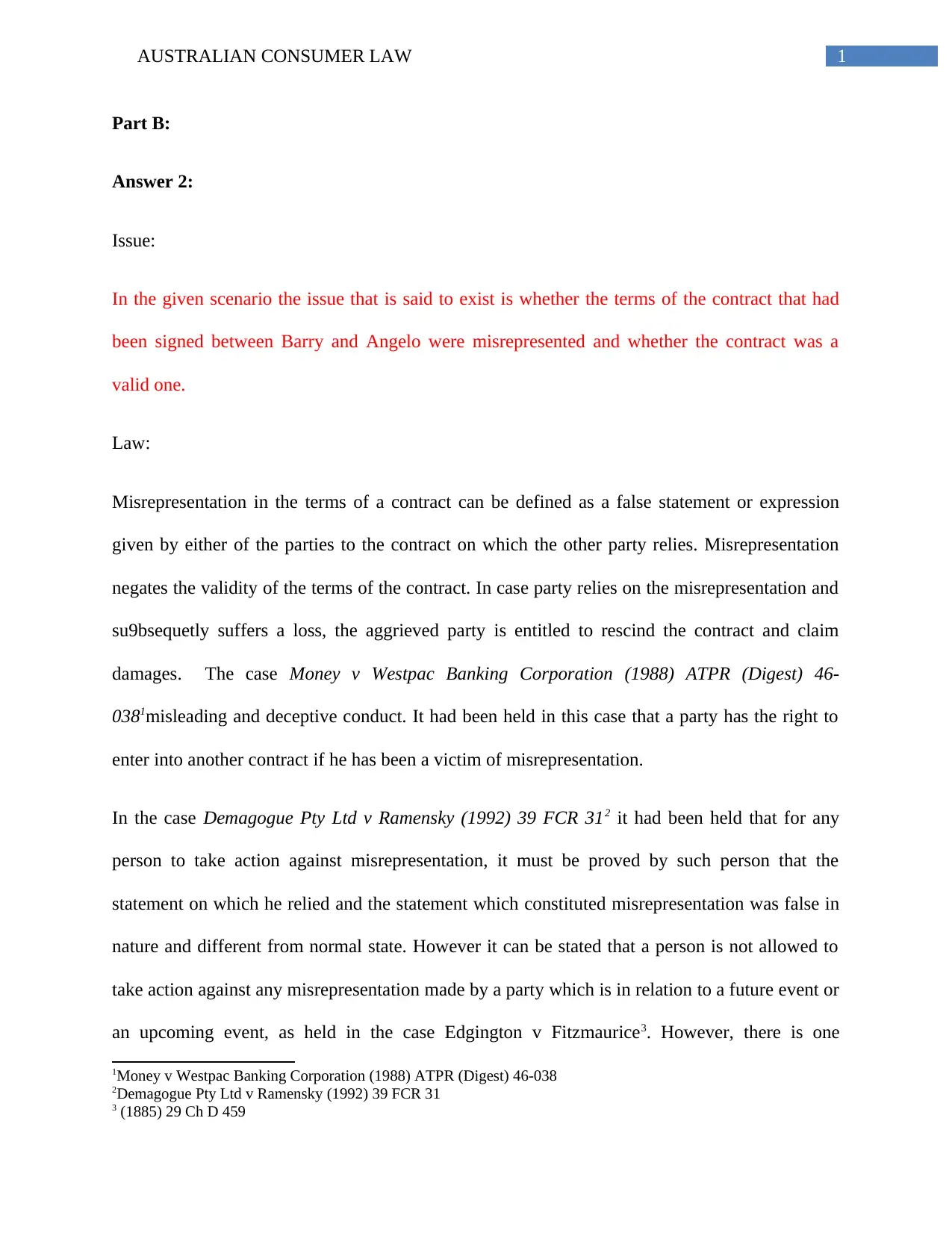
1AUSTRALIAN CONSUMER LAW
Part B:
Answer 2:
Issue:
In the given scenario the issue that is said to exist is whether the terms of the contract that had
been signed between Barry and Angelo were misrepresented and whether the contract was a
valid one.
Law:
Misrepresentation in the terms of a contract can be defined as a false statement or expression
given by either of the parties to the contract on which the other party relies. Misrepresentation
negates the validity of the terms of the contract. In case party relies on the misrepresentation and
su9bsequetly suffers a loss, the aggrieved party is entitled to rescind the contract and claim
damages. The case Money v Westpac Banking Corporation (1988) ATPR (Digest) 46-
0381misleading and deceptive conduct. It had been held in this case that a party has the right to
enter into another contract if he has been a victim of misrepresentation.
In the case Demagogue Pty Ltd v Ramensky (1992) 39 FCR 312 it had been held that for any
person to take action against misrepresentation, it must be proved by such person that the
statement on which he relied and the statement which constituted misrepresentation was false in
nature and different from normal state. However it can be stated that a person is not allowed to
take action against any misrepresentation made by a party which is in relation to a future event or
an upcoming event, as held in the case Edgington v Fitzmaurice3. However, there is one
1Money v Westpac Banking Corporation (1988) ATPR (Digest) 46-038
2Demagogue Pty Ltd v Ramensky (1992) 39 FCR 31
3 (1885) 29 Ch D 459
Part B:
Answer 2:
Issue:
In the given scenario the issue that is said to exist is whether the terms of the contract that had
been signed between Barry and Angelo were misrepresented and whether the contract was a
valid one.
Law:
Misrepresentation in the terms of a contract can be defined as a false statement or expression
given by either of the parties to the contract on which the other party relies. Misrepresentation
negates the validity of the terms of the contract. In case party relies on the misrepresentation and
su9bsequetly suffers a loss, the aggrieved party is entitled to rescind the contract and claim
damages. The case Money v Westpac Banking Corporation (1988) ATPR (Digest) 46-
0381misleading and deceptive conduct. It had been held in this case that a party has the right to
enter into another contract if he has been a victim of misrepresentation.
In the case Demagogue Pty Ltd v Ramensky (1992) 39 FCR 312 it had been held that for any
person to take action against misrepresentation, it must be proved by such person that the
statement on which he relied and the statement which constituted misrepresentation was false in
nature and different from normal state. However it can be stated that a person is not allowed to
take action against any misrepresentation made by a party which is in relation to a future event or
an upcoming event, as held in the case Edgington v Fitzmaurice3. However, there is one
1Money v Westpac Banking Corporation (1988) ATPR (Digest) 46-038
2Demagogue Pty Ltd v Ramensky (1992) 39 FCR 31
3 (1885) 29 Ch D 459
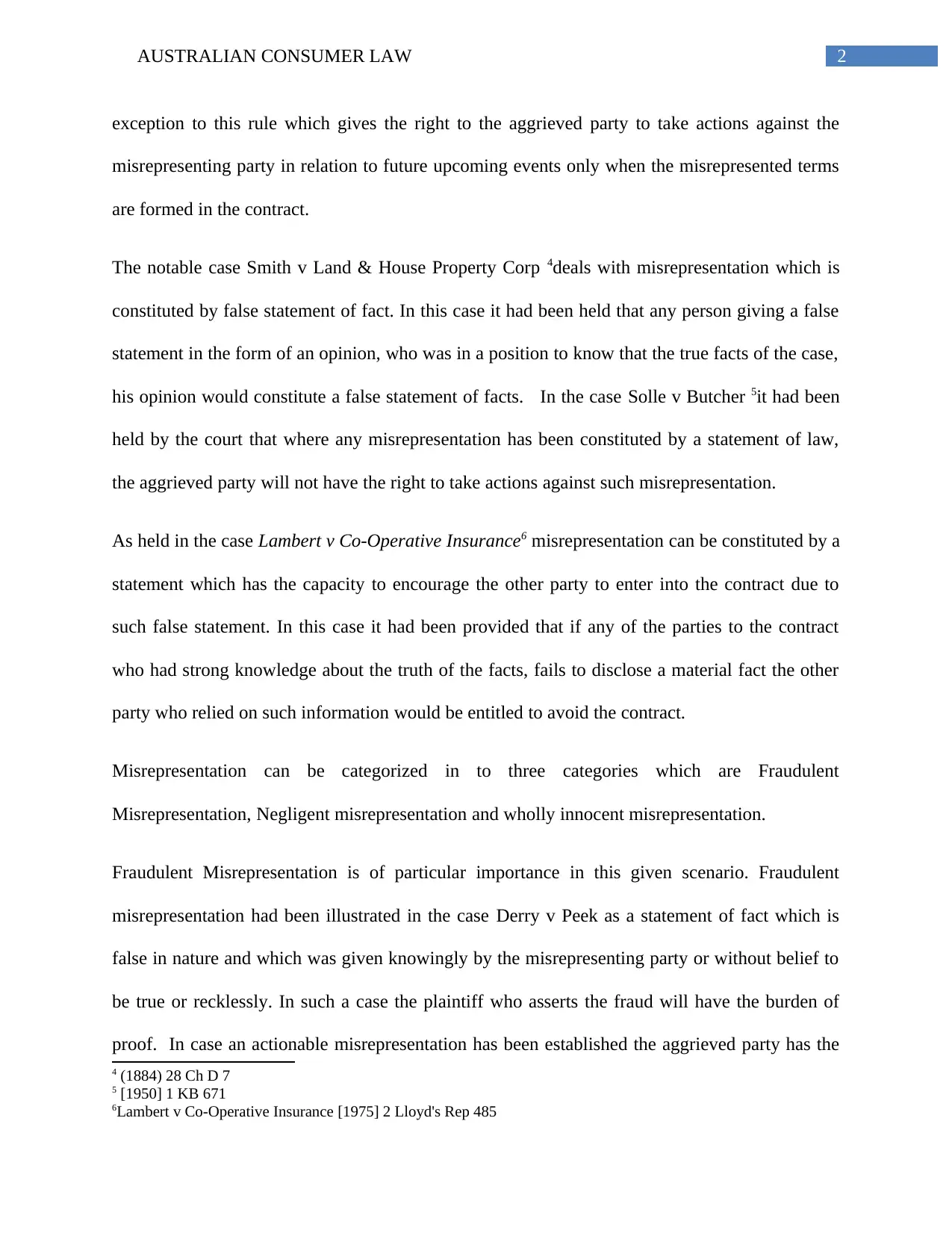
2AUSTRALIAN CONSUMER LAW
exception to this rule which gives the right to the aggrieved party to take actions against the
misrepresenting party in relation to future upcoming events only when the misrepresented terms
are formed in the contract.
The notable case Smith v Land & House Property Corp 4deals with misrepresentation which is
constituted by false statement of fact. In this case it had been held that any person giving a false
statement in the form of an opinion, who was in a position to know that the true facts of the case,
his opinion would constitute a false statement of facts. In the case Solle v Butcher 5it had been
held by the court that where any misrepresentation has been constituted by a statement of law,
the aggrieved party will not have the right to take actions against such misrepresentation.
As held in the case Lambert v Co-Operative Insurance6 misrepresentation can be constituted by a
statement which has the capacity to encourage the other party to enter into the contract due to
such false statement. In this case it had been provided that if any of the parties to the contract
who had strong knowledge about the truth of the facts, fails to disclose a material fact the other
party who relied on such information would be entitled to avoid the contract.
Misrepresentation can be categorized in to three categories which are Fraudulent
Misrepresentation, Negligent misrepresentation and wholly innocent misrepresentation.
Fraudulent Misrepresentation is of particular importance in this given scenario. Fraudulent
misrepresentation had been illustrated in the case Derry v Peek as a statement of fact which is
false in nature and which was given knowingly by the misrepresenting party or without belief to
be true or recklessly. In such a case the plaintiff who asserts the fraud will have the burden of
proof. In case an actionable misrepresentation has been established the aggrieved party has the
4 (1884) 28 Ch D 7
5 [1950] 1 KB 671
6Lambert v Co-Operative Insurance [1975] 2 Lloyd's Rep 485
exception to this rule which gives the right to the aggrieved party to take actions against the
misrepresenting party in relation to future upcoming events only when the misrepresented terms
are formed in the contract.
The notable case Smith v Land & House Property Corp 4deals with misrepresentation which is
constituted by false statement of fact. In this case it had been held that any person giving a false
statement in the form of an opinion, who was in a position to know that the true facts of the case,
his opinion would constitute a false statement of facts. In the case Solle v Butcher 5it had been
held by the court that where any misrepresentation has been constituted by a statement of law,
the aggrieved party will not have the right to take actions against such misrepresentation.
As held in the case Lambert v Co-Operative Insurance6 misrepresentation can be constituted by a
statement which has the capacity to encourage the other party to enter into the contract due to
such false statement. In this case it had been provided that if any of the parties to the contract
who had strong knowledge about the truth of the facts, fails to disclose a material fact the other
party who relied on such information would be entitled to avoid the contract.
Misrepresentation can be categorized in to three categories which are Fraudulent
Misrepresentation, Negligent misrepresentation and wholly innocent misrepresentation.
Fraudulent Misrepresentation is of particular importance in this given scenario. Fraudulent
misrepresentation had been illustrated in the case Derry v Peek as a statement of fact which is
false in nature and which was given knowingly by the misrepresenting party or without belief to
be true or recklessly. In such a case the plaintiff who asserts the fraud will have the burden of
proof. In case an actionable misrepresentation has been established the aggrieved party has the
4 (1884) 28 Ch D 7
5 [1950] 1 KB 671
6Lambert v Co-Operative Insurance [1975] 2 Lloyd's Rep 485
⊘ This is a preview!⊘
Do you want full access?
Subscribe today to unlock all pages.

Trusted by 1+ million students worldwide
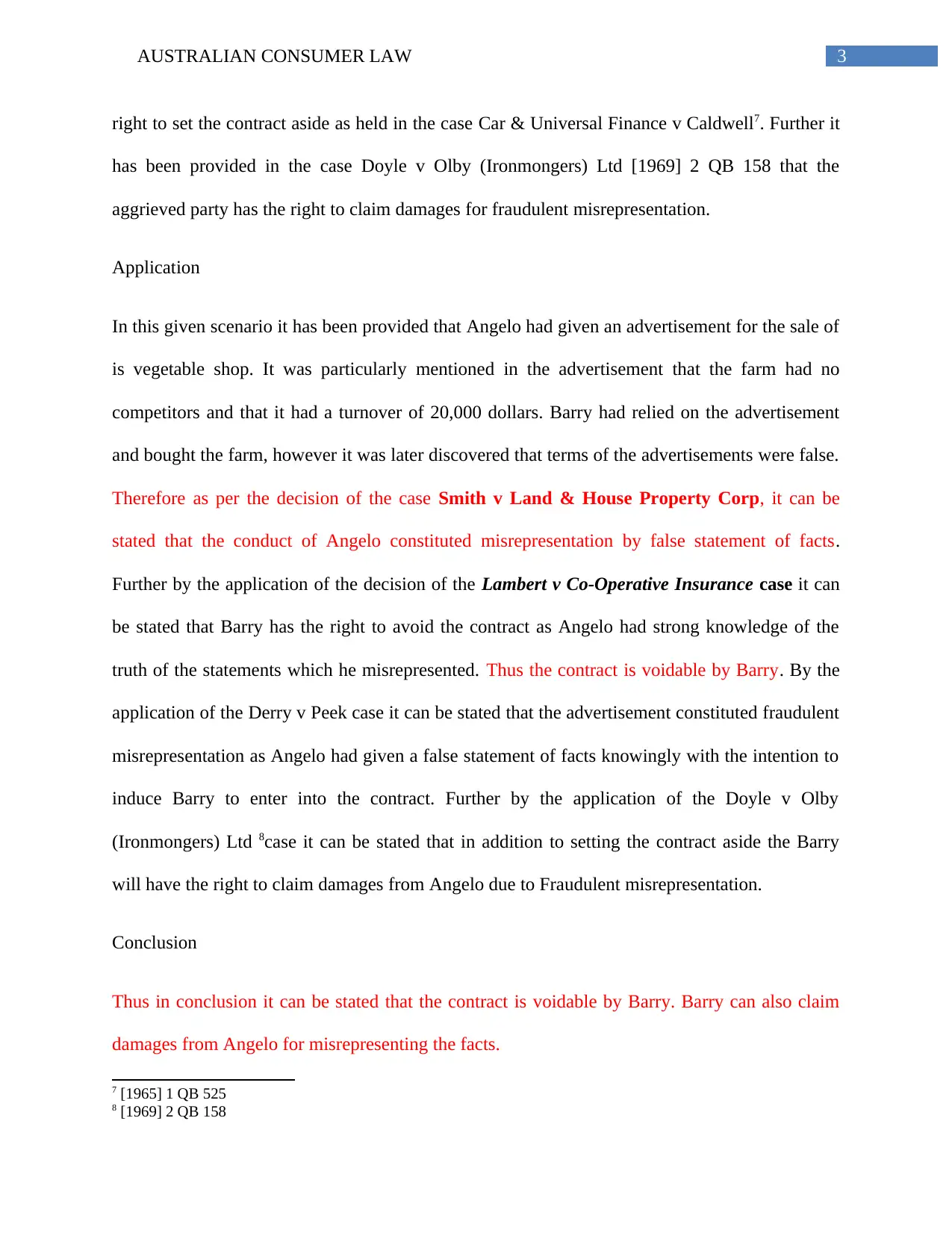
3AUSTRALIAN CONSUMER LAW
right to set the contract aside as held in the case Car & Universal Finance v Caldwell7. Further it
has been provided in the case Doyle v Olby (Ironmongers) Ltd [1969] 2 QB 158 that the
aggrieved party has the right to claim damages for fraudulent misrepresentation.
Application
In this given scenario it has been provided that Angelo had given an advertisement for the sale of
is vegetable shop. It was particularly mentioned in the advertisement that the farm had no
competitors and that it had a turnover of 20,000 dollars. Barry had relied on the advertisement
and bought the farm, however it was later discovered that terms of the advertisements were false.
Therefore as per the decision of the case Smith v Land & House Property Corp, it can be
stated that the conduct of Angelo constituted misrepresentation by false statement of facts.
Further by the application of the decision of the Lambert v Co-Operative Insurance case it can
be stated that Barry has the right to avoid the contract as Angelo had strong knowledge of the
truth of the statements which he misrepresented. Thus the contract is voidable by Barry. By the
application of the Derry v Peek case it can be stated that the advertisement constituted fraudulent
misrepresentation as Angelo had given a false statement of facts knowingly with the intention to
induce Barry to enter into the contract. Further by the application of the Doyle v Olby
(Ironmongers) Ltd 8case it can be stated that in addition to setting the contract aside the Barry
will have the right to claim damages from Angelo due to Fraudulent misrepresentation.
Conclusion
Thus in conclusion it can be stated that the contract is voidable by Barry. Barry can also claim
damages from Angelo for misrepresenting the facts.
7 [1965] 1 QB 525
8 [1969] 2 QB 158
right to set the contract aside as held in the case Car & Universal Finance v Caldwell7. Further it
has been provided in the case Doyle v Olby (Ironmongers) Ltd [1969] 2 QB 158 that the
aggrieved party has the right to claim damages for fraudulent misrepresentation.
Application
In this given scenario it has been provided that Angelo had given an advertisement for the sale of
is vegetable shop. It was particularly mentioned in the advertisement that the farm had no
competitors and that it had a turnover of 20,000 dollars. Barry had relied on the advertisement
and bought the farm, however it was later discovered that terms of the advertisements were false.
Therefore as per the decision of the case Smith v Land & House Property Corp, it can be
stated that the conduct of Angelo constituted misrepresentation by false statement of facts.
Further by the application of the decision of the Lambert v Co-Operative Insurance case it can
be stated that Barry has the right to avoid the contract as Angelo had strong knowledge of the
truth of the statements which he misrepresented. Thus the contract is voidable by Barry. By the
application of the Derry v Peek case it can be stated that the advertisement constituted fraudulent
misrepresentation as Angelo had given a false statement of facts knowingly with the intention to
induce Barry to enter into the contract. Further by the application of the Doyle v Olby
(Ironmongers) Ltd 8case it can be stated that in addition to setting the contract aside the Barry
will have the right to claim damages from Angelo due to Fraudulent misrepresentation.
Conclusion
Thus in conclusion it can be stated that the contract is voidable by Barry. Barry can also claim
damages from Angelo for misrepresenting the facts.
7 [1965] 1 QB 525
8 [1969] 2 QB 158
Paraphrase This Document
Need a fresh take? Get an instant paraphrase of this document with our AI Paraphraser
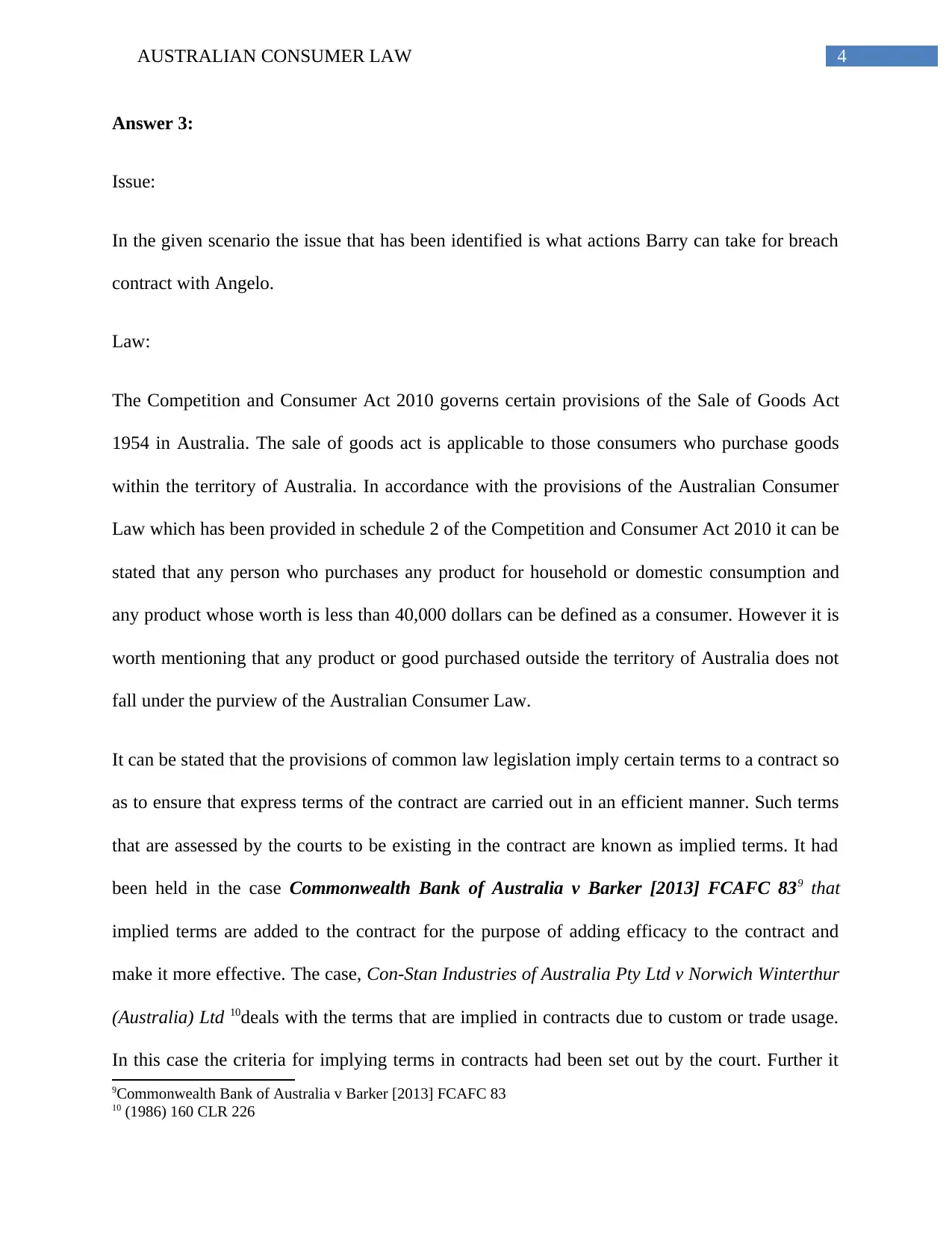
4AUSTRALIAN CONSUMER LAW
Answer 3:
Issue:
In the given scenario the issue that has been identified is what actions Barry can take for breach
contract with Angelo.
Law:
The Competition and Consumer Act 2010 governs certain provisions of the Sale of Goods Act
1954 in Australia. The sale of goods act is applicable to those consumers who purchase goods
within the territory of Australia. In accordance with the provisions of the Australian Consumer
Law which has been provided in schedule 2 of the Competition and Consumer Act 2010 it can be
stated that any person who purchases any product for household or domestic consumption and
any product whose worth is less than 40,000 dollars can be defined as a consumer. However it is
worth mentioning that any product or good purchased outside the territory of Australia does not
fall under the purview of the Australian Consumer Law.
It can be stated that the provisions of common law legislation imply certain terms to a contract so
as to ensure that express terms of the contract are carried out in an efficient manner. Such terms
that are assessed by the courts to be existing in the contract are known as implied terms. It had
been held in the case Commonwealth Bank of Australia v Barker [2013] FCAFC 839 that
implied terms are added to the contract for the purpose of adding efficacy to the contract and
make it more effective. The case, Con-Stan Industries of Australia Pty Ltd v Norwich Winterthur
(Australia) Ltd 10deals with the terms that are implied in contracts due to custom or trade usage.
In this case the criteria for implying terms in contracts had been set out by the court. Further it
9Commonwealth Bank of Australia v Barker [2013] FCAFC 83
10 (1986) 160 CLR 226
Answer 3:
Issue:
In the given scenario the issue that has been identified is what actions Barry can take for breach
contract with Angelo.
Law:
The Competition and Consumer Act 2010 governs certain provisions of the Sale of Goods Act
1954 in Australia. The sale of goods act is applicable to those consumers who purchase goods
within the territory of Australia. In accordance with the provisions of the Australian Consumer
Law which has been provided in schedule 2 of the Competition and Consumer Act 2010 it can be
stated that any person who purchases any product for household or domestic consumption and
any product whose worth is less than 40,000 dollars can be defined as a consumer. However it is
worth mentioning that any product or good purchased outside the territory of Australia does not
fall under the purview of the Australian Consumer Law.
It can be stated that the provisions of common law legislation imply certain terms to a contract so
as to ensure that express terms of the contract are carried out in an efficient manner. Such terms
that are assessed by the courts to be existing in the contract are known as implied terms. It had
been held in the case Commonwealth Bank of Australia v Barker [2013] FCAFC 839 that
implied terms are added to the contract for the purpose of adding efficacy to the contract and
make it more effective. The case, Con-Stan Industries of Australia Pty Ltd v Norwich Winterthur
(Australia) Ltd 10deals with the terms that are implied in contracts due to custom or trade usage.
In this case the criteria for implying terms in contracts had been set out by the court. Further it
9Commonwealth Bank of Australia v Barker [2013] FCAFC 83
10 (1986) 160 CLR 226
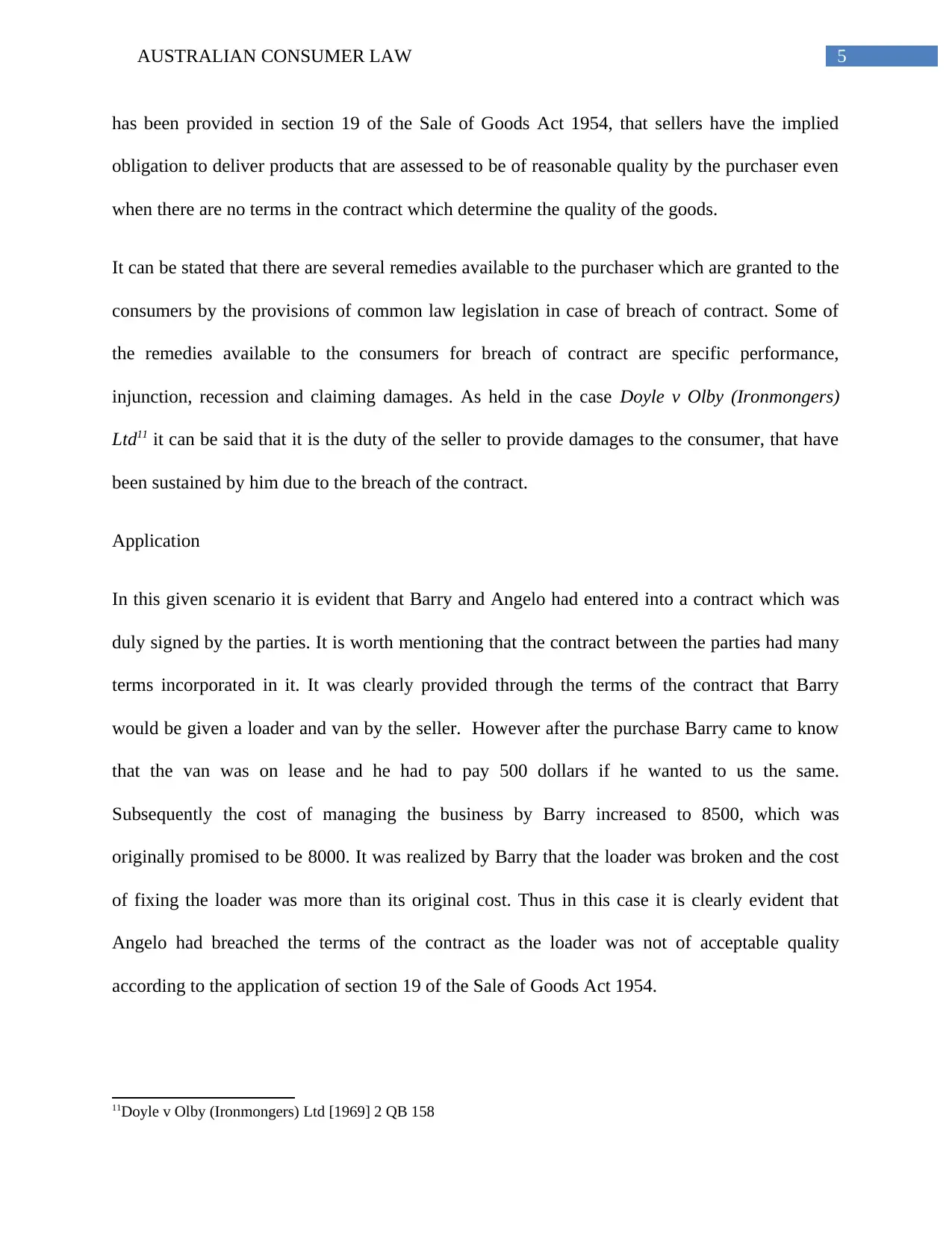
5AUSTRALIAN CONSUMER LAW
has been provided in section 19 of the Sale of Goods Act 1954, that sellers have the implied
obligation to deliver products that are assessed to be of reasonable quality by the purchaser even
when there are no terms in the contract which determine the quality of the goods.
It can be stated that there are several remedies available to the purchaser which are granted to the
consumers by the provisions of common law legislation in case of breach of contract. Some of
the remedies available to the consumers for breach of contract are specific performance,
injunction, recession and claiming damages. As held in the case Doyle v Olby (Ironmongers)
Ltd11 it can be said that it is the duty of the seller to provide damages to the consumer, that have
been sustained by him due to the breach of the contract.
Application
In this given scenario it is evident that Barry and Angelo had entered into a contract which was
duly signed by the parties. It is worth mentioning that the contract between the parties had many
terms incorporated in it. It was clearly provided through the terms of the contract that Barry
would be given a loader and van by the seller. However after the purchase Barry came to know
that the van was on lease and he had to pay 500 dollars if he wanted to us the same.
Subsequently the cost of managing the business by Barry increased to 8500, which was
originally promised to be 8000. It was realized by Barry that the loader was broken and the cost
of fixing the loader was more than its original cost. Thus in this case it is clearly evident that
Angelo had breached the terms of the contract as the loader was not of acceptable quality
according to the application of section 19 of the Sale of Goods Act 1954.
11Doyle v Olby (Ironmongers) Ltd [1969] 2 QB 158
has been provided in section 19 of the Sale of Goods Act 1954, that sellers have the implied
obligation to deliver products that are assessed to be of reasonable quality by the purchaser even
when there are no terms in the contract which determine the quality of the goods.
It can be stated that there are several remedies available to the purchaser which are granted to the
consumers by the provisions of common law legislation in case of breach of contract. Some of
the remedies available to the consumers for breach of contract are specific performance,
injunction, recession and claiming damages. As held in the case Doyle v Olby (Ironmongers)
Ltd11 it can be said that it is the duty of the seller to provide damages to the consumer, that have
been sustained by him due to the breach of the contract.
Application
In this given scenario it is evident that Barry and Angelo had entered into a contract which was
duly signed by the parties. It is worth mentioning that the contract between the parties had many
terms incorporated in it. It was clearly provided through the terms of the contract that Barry
would be given a loader and van by the seller. However after the purchase Barry came to know
that the van was on lease and he had to pay 500 dollars if he wanted to us the same.
Subsequently the cost of managing the business by Barry increased to 8500, which was
originally promised to be 8000. It was realized by Barry that the loader was broken and the cost
of fixing the loader was more than its original cost. Thus in this case it is clearly evident that
Angelo had breached the terms of the contract as the loader was not of acceptable quality
according to the application of section 19 of the Sale of Goods Act 1954.
11Doyle v Olby (Ironmongers) Ltd [1969] 2 QB 158
⊘ This is a preview!⊘
Do you want full access?
Subscribe today to unlock all pages.

Trusted by 1+ million students worldwide
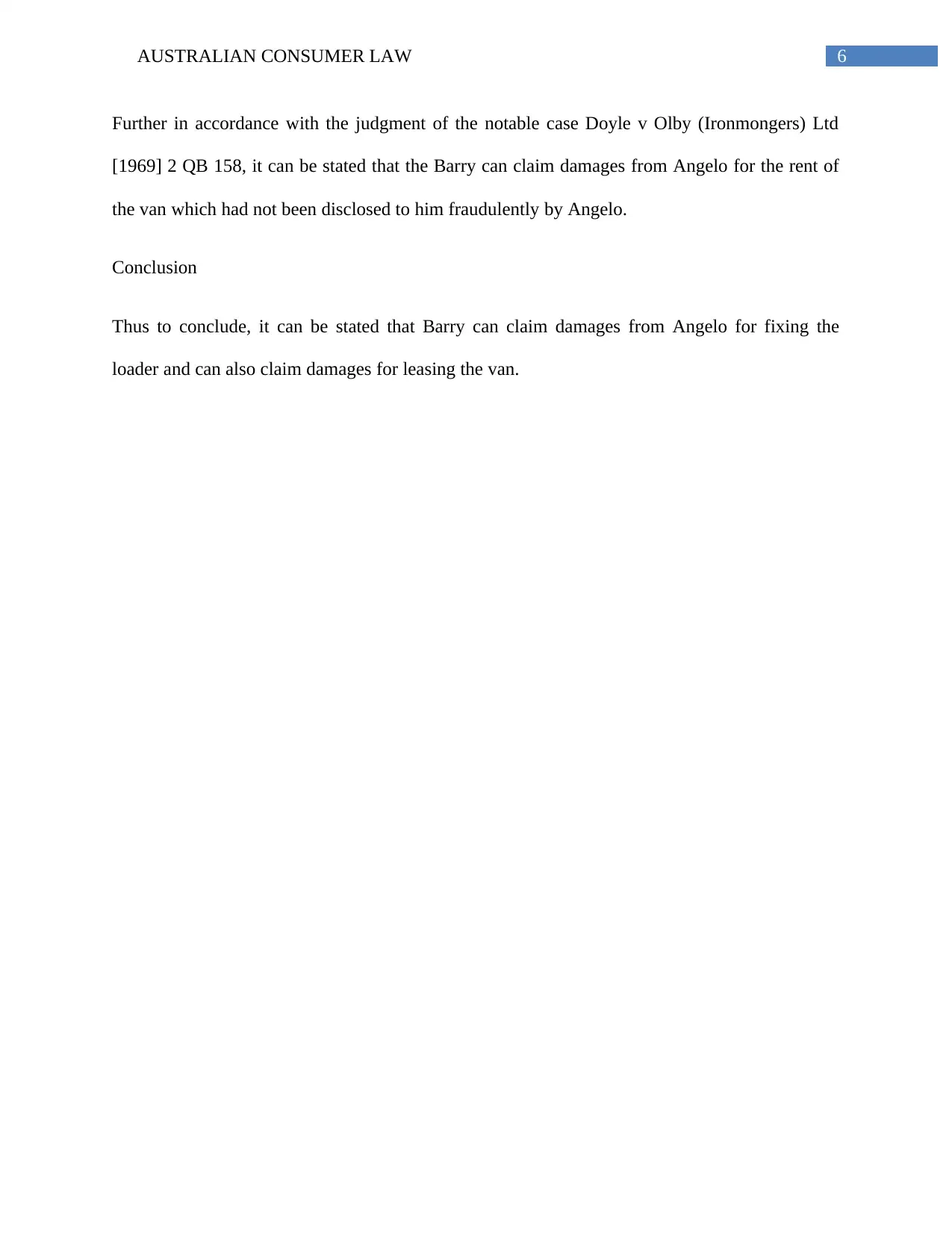
6AUSTRALIAN CONSUMER LAW
Further in accordance with the judgment of the notable case Doyle v Olby (Ironmongers) Ltd
[1969] 2 QB 158, it can be stated that the Barry can claim damages from Angelo for the rent of
the van which had not been disclosed to him fraudulently by Angelo.
Conclusion
Thus to conclude, it can be stated that Barry can claim damages from Angelo for fixing the
loader and can also claim damages for leasing the van.
Further in accordance with the judgment of the notable case Doyle v Olby (Ironmongers) Ltd
[1969] 2 QB 158, it can be stated that the Barry can claim damages from Angelo for the rent of
the van which had not been disclosed to him fraudulently by Angelo.
Conclusion
Thus to conclude, it can be stated that Barry can claim damages from Angelo for fixing the
loader and can also claim damages for leasing the van.
Paraphrase This Document
Need a fresh take? Get an instant paraphrase of this document with our AI Paraphraser
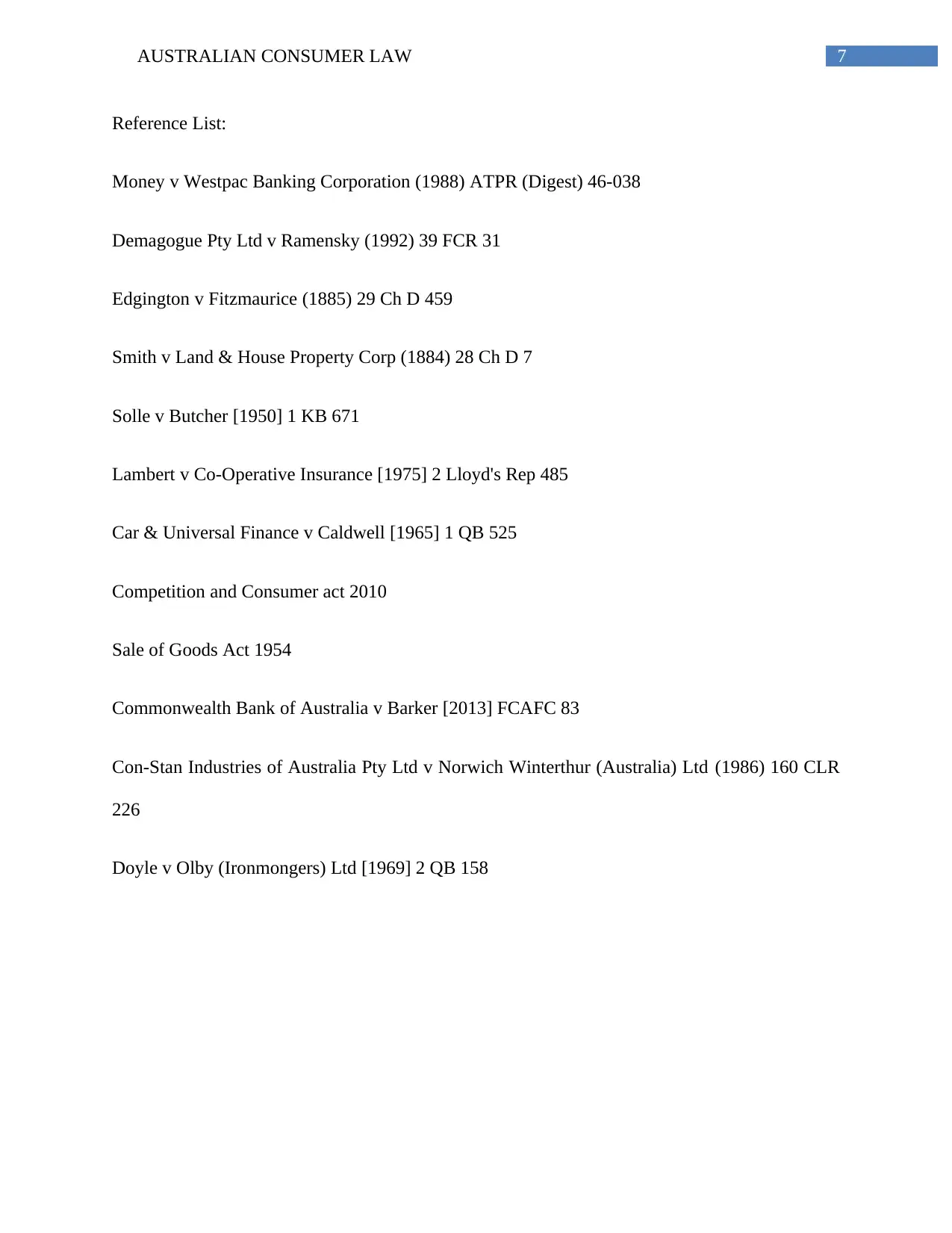
7AUSTRALIAN CONSUMER LAW
Reference List:
Money v Westpac Banking Corporation (1988) ATPR (Digest) 46-038
Demagogue Pty Ltd v Ramensky (1992) 39 FCR 31
Edgington v Fitzmaurice (1885) 29 Ch D 459
Smith v Land & House Property Corp (1884) 28 Ch D 7
Solle v Butcher [1950] 1 KB 671
Lambert v Co-Operative Insurance [1975] 2 Lloyd's Rep 485
Car & Universal Finance v Caldwell [1965] 1 QB 525
Competition and Consumer act 2010
Sale of Goods Act 1954
Commonwealth Bank of Australia v Barker [2013] FCAFC 83
Con-Stan Industries of Australia Pty Ltd v Norwich Winterthur (Australia) Ltd (1986) 160 CLR
226
Doyle v Olby (Ironmongers) Ltd [1969] 2 QB 158
Reference List:
Money v Westpac Banking Corporation (1988) ATPR (Digest) 46-038
Demagogue Pty Ltd v Ramensky (1992) 39 FCR 31
Edgington v Fitzmaurice (1885) 29 Ch D 459
Smith v Land & House Property Corp (1884) 28 Ch D 7
Solle v Butcher [1950] 1 KB 671
Lambert v Co-Operative Insurance [1975] 2 Lloyd's Rep 485
Car & Universal Finance v Caldwell [1965] 1 QB 525
Competition and Consumer act 2010
Sale of Goods Act 1954
Commonwealth Bank of Australia v Barker [2013] FCAFC 83
Con-Stan Industries of Australia Pty Ltd v Norwich Winterthur (Australia) Ltd (1986) 160 CLR
226
Doyle v Olby (Ironmongers) Ltd [1969] 2 QB 158
1 out of 8
Related Documents
Your All-in-One AI-Powered Toolkit for Academic Success.
+13062052269
info@desklib.com
Available 24*7 on WhatsApp / Email
![[object Object]](/_next/static/media/star-bottom.7253800d.svg)
Unlock your academic potential
Copyright © 2020–2026 A2Z Services. All Rights Reserved. Developed and managed by ZUCOL.





